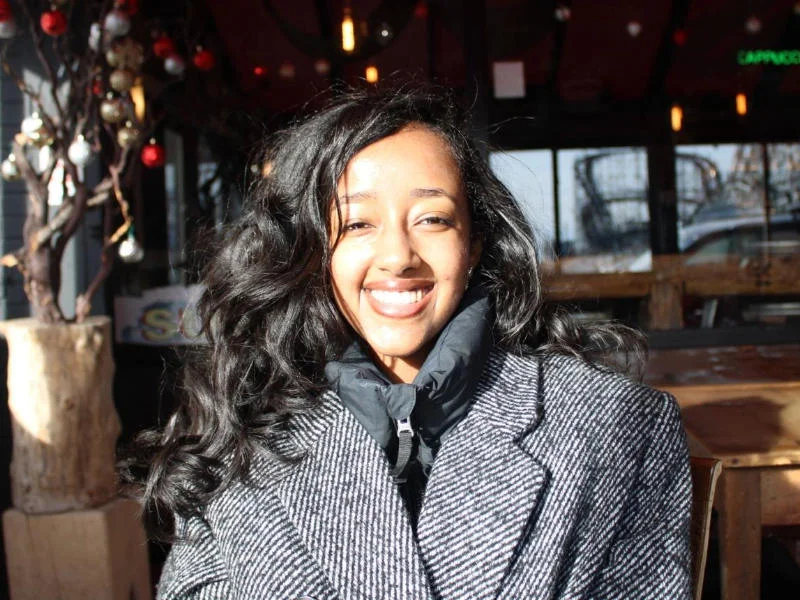Allela Gebremedhin
MSc Behavioural Science
2024/25
Learn more about Allela's background and experience as an AKO scholarship holder in the Department of Psychological and Behavioural Science.

The support from the AKO Foundation has been instrumental in making my MSc studies at LSE possible.
Hi Allela! Thank you for talking to us. Can you share a little about your background? Where did you grow up, and what were you doing prior to starting your studies at LSE?
My name is Allela, and I grew up in Addis Ababa, Ethiopia. My academic journey took me to the United States, where I completed a double major in Economics and Politics at Messiah University. After graduating, I worked for a year at a college counselling service, helping students navigate higher education opportunities. I then moved back to Addis Ababa and became a member of the Ethiopian Economic Association, where I was able to engage with economic policy and research in my home country.
What drew you to the MSc Behavioural Science programme at LSE? What made it the right choice for you?
I was drawn to behavioural science because I am fascinated by the interdisciplinary study of human behaviour — bringing together insights from economics, psychology, politics, and beyond. Double majoring during my undergraduate studies showed me the value of approaching complex questions from multiple perspectives, and deepened my interest in understanding the drivers of individual and collective decision-making.
LSE's MSc Behavioural Science programme stood out to me because of its strong commitment to a cross-disciplinary approach, which aligns perfectly with my academic background and intellectual curiosity. The opportunity to learn from leading researchers and engage with students from around the world makes LSE the ideal place for me to further my studies. Additionally, I have always wanted to experience life in London, and being part of LSE’s global community offers the perfect combination of academic rigor and cultural immersion.
From inspiring professors to thought-provoking coursework, what aspects of your LSE experience made the biggest impact on your journey?
One aspect of my LSE experience that has made the biggest impact on my journey is the 'Dialogue: Conflict & Negotiation' course. Although I’ve long had an interest in studying conflict, this course was instrumental in refining my research focus toward the dynamics of debate and persuasion. I became deeply engaged with the way people debate, and began to examine the tactics that foster persuasion and consensus — and those that hinder them.
This new direction directly shaped my dissertation, which examines the impact of defensiveness on the endorsement of misinformation. The combination of rigorous coursework and thought-provoking seminar discussions has not only broadened my perspective, but also given me the tools and confidence to pursue my dissertation project.
As you look ahead, what’s next for you after completing your MSc — and how have your experiences in the PBS department and support from the AKO scholarship influenced your path forward?
As I look ahead, I hope to gain experience as a behavioural science consultant. The support from the AKO Foundation has been instrumental in making my MSc studies at LSE possible. Beyond easing the financial burden, the scholarship has given me the confidence to pursue bold research questions and helped foster a sense of community and encouragement throughout my time in the PBS department.
Studying at a world-leading institution can be intense — what were some of the pressures or challenges you faced, and how did you find balance and strength through it all?
Studying at a world-leading institution like LSE has been incredibly rewarding, but also demanding. The pace is fast, the expectations are high, and you're constantly surrounded by brilliant, driven peers — which can sometimes make you question your own abilities. For me, one of the biggest challenges has been overcoming imposter syndrome. It’s easy to feel like you’re falling behind or that you don’t quite belong, especially when everyone around you seems so accomplished.
I’ve found that one of the most effective ways to combat those doubts is to celebrate your accomplishments — both big and small — and to remind yourself how far you’ve come. LSE also offers excellent wellbeing and counselling services, which I’ve found incredibly helpful. Reaching out for support and talking through challenges with professionals or peers has helped me regain perspective and maintain balance.
What words of wisdom or advice would you offer to new AKO Master’s Scholars as they prepare to start their journey at LSE?
My biggest piece of advice to new AKO Master’s Scholars is to take full advantage of office hours. It’s something I wish I had done more of myself. Meeting with your professors and teaching staff — even just briefly — can give you so much more clarity and direction on your coursework, especially when it comes to summative assignments. These conversations often help you refine your ideas and feel more confident in your approach.
If you had to sum up your PBS experience in just three words, which would you choose, and why?
Challenging, inspiring, transformative.
Challenging, because studying at LSE is demanding and constantly pushes you out of your comfort zone. Inspiring, because I was surrounded by passionate faculty who are leading thinkers in their fields. And transformative, because my experience at LSE reshaped the way I approach research questions.